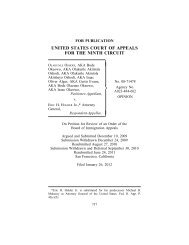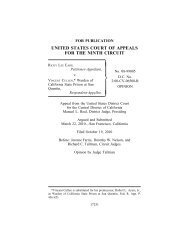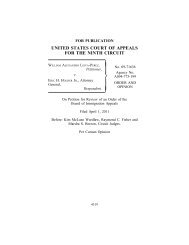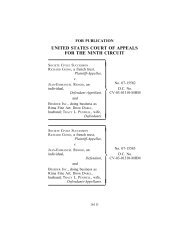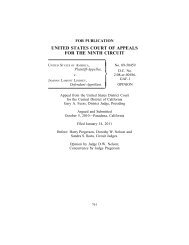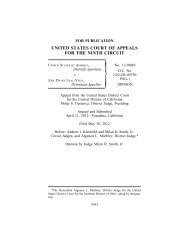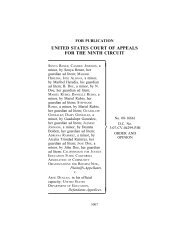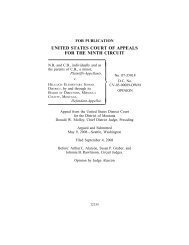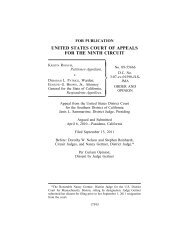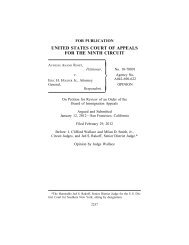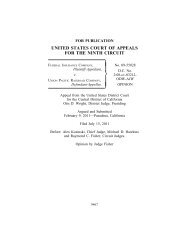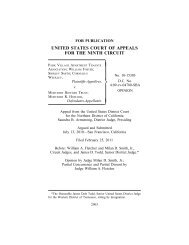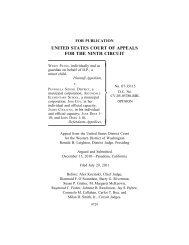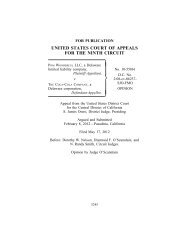USA v. Xavier Alvarez - Ninth Circuit Court of Appeals
USA v. Xavier Alvarez - Ninth Circuit Court of Appeals
USA v. Xavier Alvarez - Ninth Circuit Court of Appeals
Create successful ePaper yourself
Turn your PDF publications into a flip-book with our unique Google optimized e-Paper software.
UNITED STATES v. ALVAREZ<br />
11887<br />
important exception to this principle: where protecting a false<br />
statement is necessary “in order to protect speech that matters.”<br />
Gertz, 418 U.S. at 341; see also BE & K, 536 U.S. at<br />
531 (“[W]hile false statements may be unprotected for their<br />
own sake, ‘[t]he First Amendment requires that we protect<br />
some falsehood in order to protect speech that matters.’ ”<br />
(emphasis omitted) (second alteration in original) (quoting<br />
Gertz, 418 U.S. at 341)). In New York Times Co. v. Sullivan,<br />
376 U.S. 254 (1964), the seminal case in this area, the <strong>Court</strong><br />
extended limited First Amendment protection to libelous<br />
statements “critical <strong>of</strong> the <strong>of</strong>ficial conduct <strong>of</strong> public <strong>of</strong>ficials.”<br />
Id. at 268. Because “erroneous statement is inevitable in free<br />
debate, and . . . must be protected if the freedoms <strong>of</strong> expression<br />
are to have the ‘breathing space’ that they ‘need to survive,’<br />
” the <strong>Court</strong> feared that permitting public <strong>of</strong>ficials to<br />
bring tort claims against their critics based on a false statement<br />
<strong>of</strong> fact would “lead[ ] to . . . ‘self-censorship,’ ” deterring<br />
such critics “from voicing their criticism[ ] even though<br />
it is believed to be true and even though it is in fact true.” Id.<br />
at 271-72, 279 (ellipsis omitted). In order to protect against<br />
such “self-censorship,” the <strong>Court</strong> adopted “a federal rule that<br />
prohibits a public <strong>of</strong>ficial from recovering damages for a<br />
defamatory falsehood relating to his <strong>of</strong>ficial conduct unless he<br />
proves that the statement was made with ‘actual malice’—that<br />
is, with knowledge that it was false or with reckless disregard<br />
First Amendment protection. See John Paul Stevens, The Freedom <strong>of</strong><br />
Speech, 102 YALE L. J. 1293, 1296 (1993) (“I emphasize the word ‘the’<br />
as used in the term ‘the freedom <strong>of</strong> speech’ because the definite article<br />
suggests that the draftsmen intended to immunize a previously identified<br />
category or subset <strong>of</strong> speech. That category could not have been coextensive<br />
with the category <strong>of</strong> oral communications that are commonly<br />
described as ‘speech’ in ordinary usage. . . . The Amendment has never<br />
been understood to protect all oral communication.” (emphasis added)).<br />
Thus, the lack <strong>of</strong> protection afforded false statements <strong>of</strong> fact is no more<br />
<strong>of</strong> an “exception” to the First Amendment than the lack <strong>of</strong> First Amendment<br />
protection afforded the pulling <strong>of</strong> a gun trigger. Neither <strong>of</strong> these<br />
activities is considered part <strong>of</strong> “the freedom <strong>of</strong> speech,” so neither should<br />
be characterized as an exception to the First Amendment.



